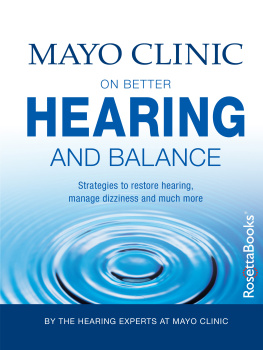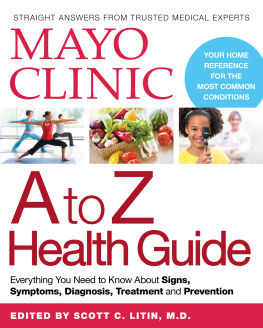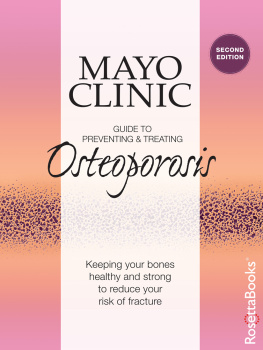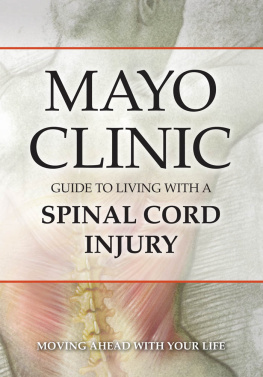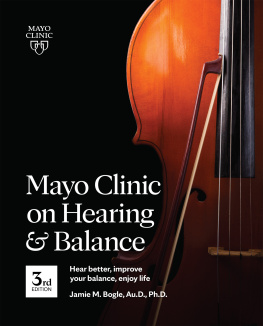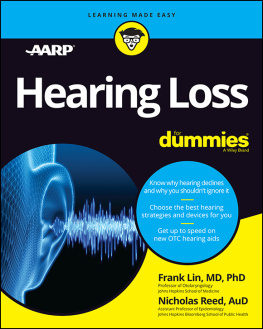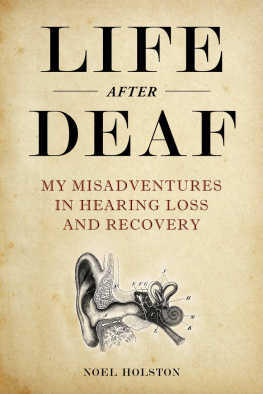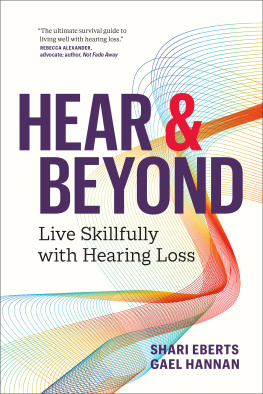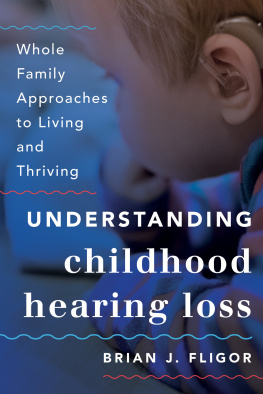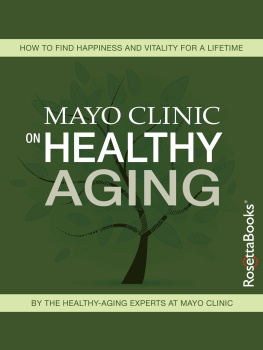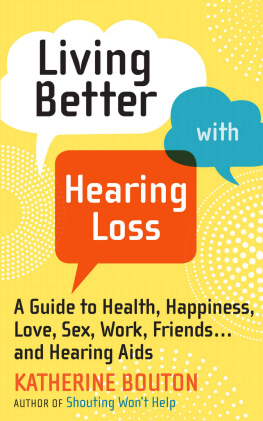
MAYO CLINIC
ON BETTER
HEARING
AND BALANCE
Christopher D. Bauch, Ph.D.
Medical Editor
Mayo Clinic
Rochester, Minnesota
Mayo Clinic on Better Hearing and Balance provides reliable information on treating and managing hearing and balance problems. Much of the information comes directly from the experience of ear, nose and throat specialists and audiologists at Mayo Clinic. This book supplements the advice of your physician, whom you should consult for individual medical problems.
This book does not endorse any company or product. MAYO, MAYO CLINIC and the Mayo triple-shield logo are marks of Mayo Foundation for Medical Education and Research.
All rights reserved. No part of this book may be reproduced or used in any form or by any means, electronic or mechanical, including photocopying and recording, or by any information storage and retrieval system, without permission in writing from the publisher, except by a reviewer, who may quote brief passages in review.
For bulk sales to employers, member groups and health-related companies, contact Mayo Clinic Health Solutions, 200 First St. SW, Rochester, MN 55905, or send an email to SpecialSalesMayoBooks@Mayo.edu.
Published by Mayo Clinic
2014 Mayo Foundation for Medical Education and Research (MFMER)
Second Edition
ISBN ePub edition: 9780795340819
Editorial staff
Medical Editor
Christopher D. Bauch, Ph.D.
Managing Editor
Jennifer L. Duesterhoeft
Product Manager
Christopher C. Frye
Editorial Director
Paula M. Marlow Limbeck
Art Director
Richard A. Resnick
Editorial Research
Anthony J. Cook
Amanda K. Golden
Deirdre A. Herman
Erika A. Riggin
Proofreading
Miranda M. Attlesey
Donna L. Hanson
Julie M. Maas
Production
Downtown Bookworks Inc., New York
Sara N. DiSalvo, project manager
Laura J. Smyth, designer
Indexing
Steve Rath
Contributing Editors and Reviewers
Ann B. Anderson, Au.D.
David M. Barrs, M.D.
Charles W. Beatty, M.D.
Michael J. Cevette, Ph.D.
Melissa D. DeJong, Au.D.
Colin L.W. Driscoll, M.D.
Millicent S. Garry, Au.D.
David B. Hawkins, Ph.D.
Cynthia A. Hogan, Ph.D.
Kathryn A. Kerst Larry B. Lundy, M.D.
Brian A. Neff, M.D.
Sarah R. Oakley, Au.D., C.C.C.-A
Janet S. Shelfer, Au.D.
Neil T. Shepard, Ph.D.
Douglas P. Sladen, Ph.D.
Katherine H. Teece, Au.D.
Linsey S. Wagner, Au.D.
David A. Zapala, Ph.D.
Administrative Assistant
Beverly J. Steele
Preface
Hearing loss and dizziness are two of the most common reasons to visit your doctor. Hearing loss may be present at birth (congenital) or hereditary. Dizziness may be a solitary symptom, or it may be the most debilitating of multiple symptoms. Frequently, hearing loss and balance problems are complications of illness or disease, medication, trauma, noise exposure, and the normal process of aging.
This book describes the sensitive structures and exquisite functions of the ear, which is so fundamental to good hearing and balance. Attention is focused on many common ear disorders and the ear-related problems of tinnitus and dizziness. Explanations are provided for diagnostic tests, medical treatment, surgery, habilitation and rehabilitation. This content helps you become a more informed participant in effective prevention and treatment strategies.
When hearing loss cannot be alleviated medically, many devices are available to help you communicate more easily. Hearing aids, cochlear implants and assistive listening devices are discussed in separate chapters. The treatment and management of balance problems are discussed in the final chapter.
Audiologists and ear, nose and throat specialists at Mayo Clinic facilities in Minnesota, Florida and Arizona have reviewed the content of this book for accuracy and completeness. The result is a practical resource to assist you in protecting and preserving your hearing, maintaining your mobility and balance, and minimizing the impact of hearing loss, dizziness and imbalance on your daily life.

Christopher D. Bauch, Ph.D.
Medical Editor
Table of contents
Part 1
Understanding common hearing problems
Chapter 1
How you hear
In 1802 the famed German composer Ludwig van Beethoven wrote a letter to his brothers about his deteriorating hearing: I am compelled to live as an exile. If I approach near to people, a feeling of hot anxiety comes over me lest my condition should be noticed.
Its striking that such feelings belonged to a composer whose music, more than two centuries later, still brings so much listening enjoyment to people around the world.
But if youre experiencing problems with hearing, you like Beethoven may feel uncomfortable when youre in social situations and conversing with others. Not being able to hear clearly can be frustrating, to say the least, as you try to maintain the conversation and go about your day.
Hearing loss can cause social isolation because you may find it easier to withdraw from group activities rather than participate in them. Such behavior might in turn cause people to think of you as timid or disconnected and give up trying to communicate with you.
Then again, if you have hearing loss, you have plenty of company. About 17 percent of Americans 36 million have some degree of hearing loss, ranging from mild to profound.
Older adults are most affected, as hearing tends to deteriorate with age. An estimated one-third of Americans ages 65 to 74, and approximately half of those age 75 and older, have a hearing impairment. But hearing loss can occur at any age due to factors such as noise exposure, trauma, genetics and illness. Worldwide, the number of people with disabling hearing loss is estimated at 360 million a figure much higher when mild hearing loss is included.
Many people refuse to acknowledge their hearing loss. Estimates are that only about 1 person in 5 who would benefit from a hearing aid actually wears one. Many choose to persevere without any assistance.
According to a study from the National Council on Aging, people with hearing impairment who dont use hearing aids are more likely to feel sad or anxious, be less active socially, and feel greater emotional insecurity than are those with hearing impairment who do use hearing aids. The study also reported that hearing aid users maintained better relationships with their families.
Theres even evidence to suggest that, in addition to the emotional and social consequences of hearing loss, some cognitive functions may be affected. Specifically, a recent study reported a relationship between hearing loss and the risk of developing dementia.
Hearing aids have come a long way since the conspicuous ear trumpets of the 18th and 19th centuries. In fact, astounding improvements in hearing technology have been made in the last few decades. More options for treating hearing loss are available. And some of these options are not even noticeable to onlookers. The key is to find a treatment that fits your needs and lifestyle.
In the chapters that follow, youll find pertinent information about hearing loss why it occurs, how its diagnosed, how it can be treated and how you can live with it. Youll also learn about dizziness and problems with balance, conditions that sometimes are associated with hearing difficulties. This knowledge will help you live an active life despite any changes that may occur to your hearing.
Next page
